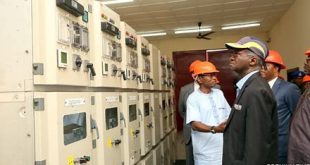The drive to enthrone a digital economy in Nigeria may not be impactful without adequate and thorough research.
This is according to the Director, World Bank Sponsored Africa Centre of ICT-Driven Knowledge Park, and immediate past Dean, Faculty of Technology, Obafemi Awolowo University, Ile Ife, Prof. ‘Sola Aderounmu.
Aderounmu, who was also the former President, Nigeria Computer Society (NCS), stated this in an article submitted to the Research Management Office of the University of Ibadan, Oyo State. He said there can be no digital economy without research, simply because innovations are what drive the digital economy, but innovations are themselves fuelled by research.
According to him, in metaphorical denotations, innovation is the oxygen of the digital economy while research is the lifeblood of innovation.
“So, as nations and governments strive to build or grow their own digital economies, they must pay priority attention and provide massive funding to Research & Development activities and projects in the academia and tech industry.
“Thanks to the Tertiary Education Trust Fund (TETFund) which is currently playing a key role in funding research in higher institutions of learning in Nigeria, and establishment of Centres of Excellence of which University of Ibadan is a beneficiary.”
By way of definition, the former NCS boss noted that the digital economy lends itself to diverse significations, but essentially, it is, according to a World Bank Digital Economy report referencing Ernst and Young, “the part of economic output derived solely or primarily from digital technologies (ICT) with a business model based on digital goods or services.”
According to him, in metaphorical denotations, innovation is the oxygen of the digital economy while research is the lifeblood of innovation.
“So, as nations and governments strive to build or grow their own digital economies, they must pay priority attention and provide massive funding to Research & Development activities and projects in the academia and tech industry.
“Thanks to the Tertiary Education Trust Fund (TETFund) which is currently playing a key role in funding research in higher institutions of learning in Nigeria, and establishment of Centres of Excellence of which University of Ibadan is a beneficiary.”
By way of definition, the former NCS boss noted that the digital economy lends itself to diverse significations, but essentially, it is, according to a World Bank Digital Economy report referencing Ernst and Young, “the part of economic output derived solely or primarily from digital technologies (ICT) with a business model based on digital goods or services.”
According to him, the report further expatiates that “digital economy is made up of various components, including a platform economy, a gig economy, an industry 4.0, a digital economy, data analytics, robotics and Artificial Intelligence (AI), machine learning, 3-D printing, and e-commerce, among others.
In other words, he said the digital economy as it is today encompasses wide-ranging economic activities that leverage digitised information and knowledge as fundamental dynamics of production.
He stressed that diverse innovative digital technologies are deployed to gather data, store data, analyse data, and then share the same data digitally to facilitate more effective interactions and efficient transactions in modern society.
Aderounmu said more innovation hubs and technology parks must be established and well-funded to expand research capabilities. He stressed that there is a critical need for deepening the strategic partnership between the academia and entrepreneurial industry, so as to ensure that research efforts yield rewarding outcomes that benefit society and advance the digital economy.
“What is more, the collaboration between the academia and industry can also explore curriculum planning for institutions of higher learning in order to evolve the right ICT programmes that will help realise the skills requirements of the future,” he added.
The immediate Past Dean also argued that above all, the implementation of a digital economy strategy must be a deliberate government policy that is well thought out and structured.
According to him, governments of developing economies such as we have in Africa need to take the right steps towards the actualisation of a modern digital economy strategy.
Aside prioritising and funding research, he said developing countries can also build a robust digital economy by promoting digital skills uptake among citizens, minimising capacity constraints, investing in wholesome ICT ecosystems, providing up-to-date digital infrastructure, facilitating easier digital access, strengthening regulatory frameworks that nurture and protect competition, and implementing policies for stimulating sustainable innovation.
 Gistfox Your News Window To The World
Gistfox Your News Window To The World 




